#ENVS 3000
Explore tagged Tumblr posts
Text
Madagascar, Lemurs, OneHealth.......a Masters? 🏝️🐒🔭🎓(U9)
Hey friends, its been a while and I’m glad you’re here!
This weeks’ prompt encourages us to share something about nature that gets us excited and ooooooooooooooooh am I excited! Like I’ve mentioned before, I’m a 4th year zoology student which 1) means I know a lot of cool animal stuff (ask me questions!), and 2) it’s almost time for me to graduate!
So today I’d like to talk about my current Masters application and the really cool OneHealth conservation research I have done (and hope to do again) in Madagascar!

Over the summer I got the opportunity to take the One Health Approach to Conservation Field school where we were taught zoological, ecological, and anthropological approaches to conservation issues in Madagascar’s rainforest and unique dry deciduous forest within Ankarafantsika National Park (Picture a rainforest but take away the rain, the biggest animal is the same kind of lemur as Zoboomafoo, and also the soil is like sand!!). While I won’t go into too much detail about most of the field work we practiced, like tree identification, phrenology, and size measurements, participant-observation sessions in tree-planting, rice harvesting, and a local village classroom, and of course-tent living and consistent rice and beans eating, I willllllllllll go into detail about the lemurs, cause oh so much do I love those little guys.
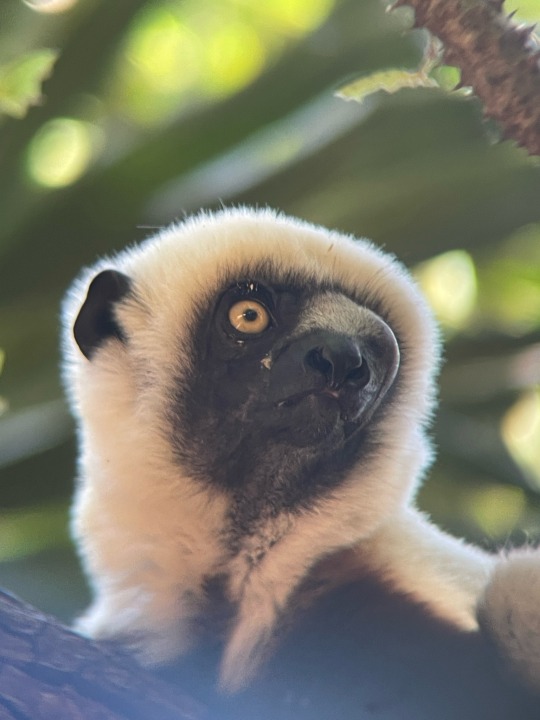

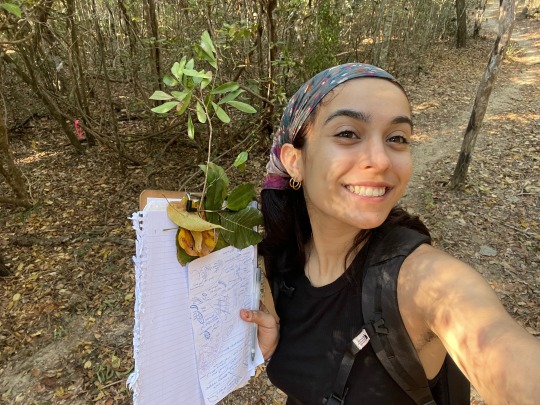

(1. Male with eye tumor/injury, 2. me with two mothers (if you look close you can see 2 baby heads!), 3. me taking leaf samples to make a dry-season Tree ID sketch, 4. my luxurious living quarters for the month.)
Our instructions were to do both focal and scan sampling, but my absolute favourite part of the trip was following the lemur groups and trying to identify the specific individuals while they were either chilling in our camp or being extremely chaotic in the forest.
During these observations, not once but twice did I witness 2 separate groups have lemurs literally try to kill an individual from the other group... and so when asking about this to my professor, the general conclusion we came to after he told me he’s never seen such violence despite coming to the park for years, was that the increased forest fragmentation (deforestation making the forest into sections rather than one continuous space) might be forcing groups that should be far apart into sharing the same spaces, causing fights for space, food, etc.
This species of lemur (Coquerel’s sifaka) is critically endangered and is a huge sense of pride for the indigenous people of Madagascar. Many of the parks residents follow taboos that forbid lemur hunting and consumption to protect these creatures. Unfortunately, its possible that either the past or current farming practices of some of them are negatively affecting lemurs, potentially without realizing. Not only does this become an anthropological issue, but if true, is a logistical problem best answered with knowledge of the lemurs behaviour, spatial and abundance knowledge on the plants used for food and shelter by both lemurs and people, and of course interviewing, participating in, and potentially educating and being educated by the residents to get a proper understanding of how to tackle this problem.
And so that’s the general gist of what I’ll be diving deeper into for my Masters, wish me luck!
[My friends video of one of the violent interactions (I know it looks like they are hugging but they have giant teeth with a strong bite force, are the size of toddlers, and it didn't give up until it thought the other was practically dead), the lemur that didn't run away was left with a bleeding head and injured arm but we think she survived!]
#Madagascar#Ankarafantsika National Park#OneHealth#Zoology#Ecology#Anthropology#Sifaka#Coquerels sifaka#lemurs#field work#conservation#envs 3000#science communication#behaviour research
12 notes
·
View notes
Text
Disclaimer
This blog was created for ENVS 3000 Tara Kaur, University of Guelph.
The opinions expressed here represent my own and not those of the University of Guelph.
The University of Guelph is not responsible for the accuracy of any of the information supplied by this blog.
0 notes
Text
Hi Sam! I had such a good time reading this post and I think its so cool how our stories are so similar, probably like many of the other students who ended up in environmental and wildlife related studies here at Guelph (and I Iove that!! go us!). I too became a vegetarian in grade 9 after having to sit through a horrendous class that included a couple slaughterhouse videos.
Now, to lighten the mood and perhaps more importantly, what's your favourite shell?! I also use to collect them but somehow never thought to identify them past there being "pretty" or "awesome" ones. I think it would be really nice to start my deep dive with a good one you suggest :)
I also wanted to touch on you saying you had a buuuunch of furry friends during your time spent working alongside animals because I know the feeling! I’d be interested to know how it sounds to people who haven’t had a similar experience though, maybe awesome? Maybe crazy? I worked at an exotic animal sanctuary in highschool and would find myself talking to my family so much more about the animals then any human friends and (at least for me), it can really get to the point where spending a couple hours brushing an Angora rabbit or bonding with sugar gliders or a fox is just as fun as being around other people. Thanks for the read and I look forward to seeing what else you post here!
Unit 01 Blog Post - Relationship with Nature 🐿️
Describe your current relationship with nature. How has this developed/evolved? Who offered you “a sense of place,” as described in our textbook?
Hi everyone! My name is Sam (she/her) and this is my third year in the Bachelor of Science in Environmental Sciences (Ecology) program here at the University of Guelph.
Like many, my positive relationship with nature developed from a young age. My fondest memories from childhood are homed by forests, rivers, and family gardens. Observing lily pads while canoeing with my mom, petting banded wooly bear caterpillars Pyrrharctia isabella on hikes, thanking trees for letting me climb their branches, and staying up late reading so I could identify every shell I found on the beach. I felt a strong urge to nurture nature as it did for me, despite the fact I had so much growth ahead.
The summer before highschool I started volunteering as a camp counselor at a farm on the Niagara Escarpment, where I found my “sense of place” in nature surrounded by free-roaming chickens, acres of horse pasture, and a group of children eager to learn about forming relationships with animals. Around the same time, I attended “Discovery Vet School” at the University of Guelph, which opened my eyes to the plausible academic future I had in the environmental sector. One of the lectures focused on the ethics of the meat industry, needless to say (against my family’s wishes) my stubborn grade 9 self was vegetarian by the time I got home— an ethical decision that has stuck with me these past seven (7) years. In highschool, I also started volunteering with and fostering for the Humane Society and private animal rescues. With a focus on neonatal kittens, my desire to research the biology and behaviour behind animals skyrocketed. At the same time, I was mesmerized by how deeply bonded I felt to each individual in my care (over 50 cats and kittens by the time I was moving away!). These deep bonds transitioned to plant life too. I started working for a local garden centre and conservation area in my last year of high school, which brought along incredible mentors and life-long friendships built on the foundation of a love for nature.
I spent Summer 2023 as a full-time Plant & Biocontrol Research Assistant at Vineland Research & Innovation Centre, where I contributed to a variety of experimental projects involving plants, insects, and growth substrates. Whether I was identifying/tracking microscopic insects, testing soil pH levels from Ontario conservation areas, conducting biostimulant fieldwork, or caring for hundreds of greenhouse plants, each day took my passion for ecology to a more feasibly impactful level— I loved it! However, this newfound “measurement of impact” came from a western science perspective spent in labs where all my observations were easily transferable to a spreadsheet. When I was tired from long days of work, it was still nature that would soothe my aches and cradle my mental exhaustion. Evenings spent digging around in my home garden and harvesting vegetables grown without the grand purpose of contributing to scientific reports. Evenings spent reading in the grass accompanied by my family cat and best friend, Delilah, while watching insects crawl between the words of the book I was reading. Evenings spent climbing the backyard tree that had watched me like a grandmother through every stage of life, despite the fact I couldn’t swing on her low hanging branches like I once did.
These moments after work, coupled with summer weekends spent hiking or kayaking, lead my story to right now. I’ve returned to the University of Guelph, taking on the role of ecology student for my third year. My “sense of place” within nature has truly blossomed here, where I spend my academic life studying our complex ecological world and my personal life finding natural influences in the music, clothing, activities, and friendships I immerse myself in. The relationship I share with nature is constantly evolving, and I’m looking forward to exploring the intricacies (and sharing them with you!) during our Nature Interpretation course this semester :)
5 notes
·
View notes
Text
From Fields To Mountains
Growing up on a small family farm in the “armpit” of Ontario, my relationship with nature has drastically evolved as I developed as a person. Initially as a young boy, I remember spending long days in the fields pulling weeds and picking rocks. Always it felt like I was trying to “tame” nature, and that it was me vs the beast, as if nature was out to destroy me. My mother being a very cautious loving mother, always warned me of the dangers of coyotes, blizzards, and poison ivy. Although as young boys do, I had an urge for adventure, and a curiosity for the world around me. Routinely I would venture off into the forest at the back of our farm (to the dismay of my mother) and explore the nature around me. I loved observing wildlife, seeing deer graze, skunks’ rout for grubs and snakes catching frogs. Keeping my hands busy, I liked to forage for materials that I could use to build primitive forts, spending the nights in them staring out at the stars and seeing the wonders of the sky above, the thousands of twinkling stars above, and back on the ground that magical display of fireflies.

Unbenounced to me at the time, I had the privilege of spending my childhood in and around nature, developing a love for the natural world from such an increasing rare perspective. As I grew up and continued my education unto university, my passion for the natural world led me to study the environmental sciences, to help me further my connection with nature. I was shocked to realise that my childhood was an ever-increasing anomaly. Most of peers grew up in large cities where their experiences with nature were limited to annual vacations to national parks or tropical forests where they too fell in love with the natural environment, although as a curiosity. Learning that many of them couldn’t see a single star in the sky back home gave me a deep appreciation for my upbring and my hardships that at the time I thought of as disadvantageous, but now realize was my greatest asset. Continuing my education, I to develop a similar curiosity as my counterparts, although to the arctic. To me an unfamiliar environment, such as nature with my city dwelling friends. Through an opportunity with my co-op program, I decided to feed this curiosity and spend a term in the Yukon. This experience stoked the fire which was my love for nature. Experiencing the “untouched” beauty of the Yukon gave me a sense of place, opening my eyes to the importance boreal ecosystems to the global carbon cycle. Responsible for sequestering carbon that was released from the other side of the globe. This helped me to not only look at the beauty that the natural environment offers us but its economical uses as well, and how moving forward we as a species can use nature to heal the wounds we created.

7 notes
·
View notes
Text
Blog 1: Connected to Nature
Hello, ENVS*3000 friends! I'm Maia, and I am in my third year of Biological Sciences. Welcome to my first blog :)
I would describe my current connection with nature as a profound yet carefree essence. I come from the city, more precisely, North Toronto; I found myself yearning for nature's embrace from a young age, perhaps triggered by its scarcity in my urban surroundings. Recognizing my affinity, my dad, a nature enthusiast, actively fueled my passion through camping adventures, hiking escapades, and shared moments immersed in captivating David Attenborough documentaries. In the midst of a large Italian family, where the majority remained indifferent to the natural world, I stood out as the quiet one, the nature lover, aspiring Dr.-to-be. Amidst this, my dad became my reliable support, sharing the same passion for the great outdoors. His passion for wildlife and landscape photography became a shared pursuit, complete with my very own camera.
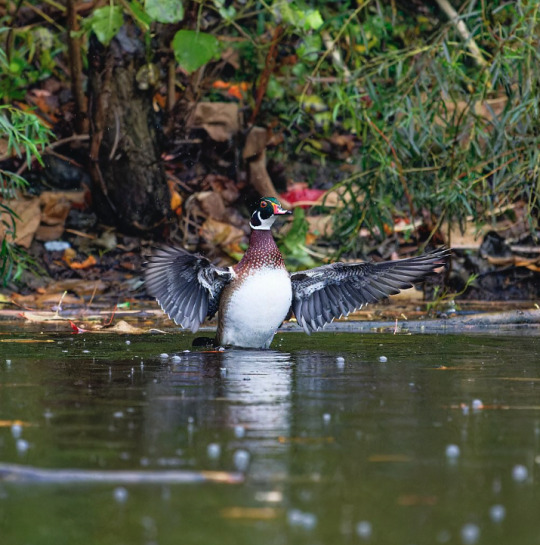
Photo of a male wood duck shot by Dino Melissa
Despite a bustling upbringing as a competitive dancer for 17 years—which is not exactly an outdoor sport—I surrounded myself with nature books, my dad's photographs, and nature documentaries. Unfortunately, while balancing a hectic city life, the opportunities for my dad and I’s outdoor adventures diminished over the years. However, as I am maturing and expanding my knowledge, I continuously discovered new ways to appreciate nature and its interconnected web of life - not mosquitoes though…
In my quest to inspire others to view nature through a similar lens as I do, I spent the past summer at a wildlife hospital, manning the front desk. Handling cases ranging from fallen hawks to orphaned baby raccoons to pigeons with string around their feet, I strived to educate callers about wildlife while debunking misconceptions. Some common ones are that pigeons are dirty and will give us diseases, and snakes are evil - spoiler alert, both are very wrong! While not everyone appreciated or grasped the educational aspect—some mistaking us for pest removal—many left with a newfound understanding of Ontario's wildlife. Small changes, after all, contribute to a broader impact of protecting our native species. This job expanded my knowledge - which I still try to share with anyone who will listen - and played a pivotal role in further evolving my relationship with nature.
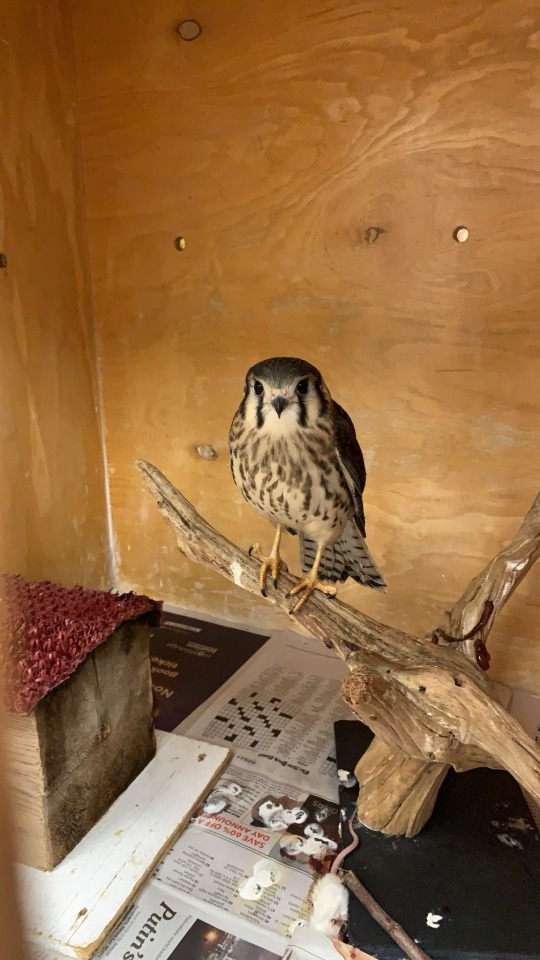
Picture of an American Kestrel
One place that has bestowed upon me a profound sense of place is my cottage—a haven of tranquillity like no other. Nestled on about an acre of land, backing onto a forest, it teems with diverse wildlife such as deer, coyotes, foxes, turkeys, grouse, and a plethora of native plants. Whether quietly observing the tree line or engaging in summer activities like kayaking and hiking, the ambient sounds of water, wind, and nature's symphony create a genuine sense of place; whenever I am there I feel as if I belong there. It's here that I yearn to escape city living permanently, trading it for the allure of a rural plot of land to live off of sustainably.
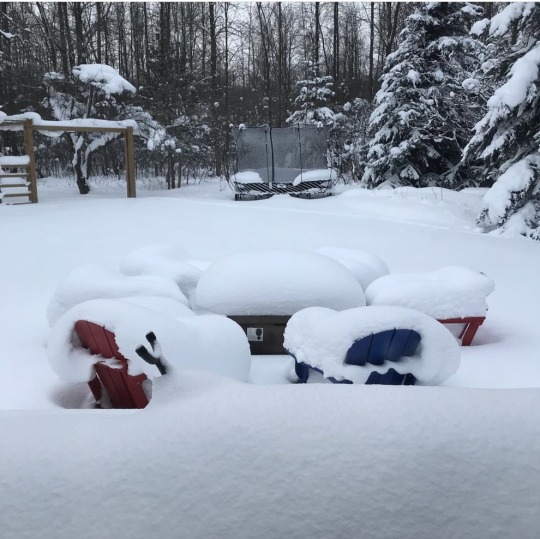
Picture of the backyard during the winter
The dream of owning a small farm and caring for animals has been a lifelong goal of mine. The charm of sustainable living intertwines with my passion for nature; here is where I hope to coexist in harmony. Through responsible practices and a deep connection with nature, I aim to contribute to the preservation of the natural world, all while feeling a permanent sense of place like no other.
21 notes
·
View notes
Text
UNIT 1: Launching into Nature Interpretation
I have had a slightly unorthodox journey to becoming interested in nature, as the concept of studying nature in university has only recently occurred to me. For context, I grew up in the Waterloo Region which is quite a developed urban area; so there was not much opportunity for exploring vast forests or serene lakes. The concept of studying nature in school or even going for a hike wasn't even a thought in my head for the first 19 years of my life. I began university in Biomedical Sciences at a different institution (which was a very intense human-centric program with no biodiversity or environmental biology exposure), but transferred to the University of Guelph during my first year. At UoG, I had to take a required class, BIOL*1070 Discovering Biodiveristy… and boy did I discover biovideristy!
In BIOL*1070, I was lumped in a group with a bunch of biomed kids who HATED the class and just wanted to learn “useful biology,” that’s when I realized I didn't hate the class at all, it was actually my favourite first-year course I had taken! It was the other student’s closed-mindedness that made me realize how important the class was and appreciate the content so much more. I also realized that solely doing biology courses about anatomy, molecular biology, genetics and physiology made me absolutely miserable, and I had this untapped passion for ecology, evolution, environmental biology, and geography. I switched my major to Biological Sciences so I could experience the best of both worlds and have more flexibility to explore this side of biology that I had no exposure to in high school or my first year of university. Unfortunately, I think it is a common experience for students to be pigeonholed toward the medical field and human biology. I am very happy that I was forced to take BIOL*1070, I would never have done it as an elective and I wouldn't be here in ENVS*3000 or have taken half the classes on my transcript.
Additionally, BIOL*1070 also opened doors to new hobbies as I became a frequent hiker and trail runner. In BIOL*1070, we had to go on 5 nature walks for an assignment, which at the time I thought was super annoying and inconvenient but I ended up falling in love with the fresh air and sunshine. Shortly after, I started working full-time in an office and going on daily hikes and runs which absolutely saved my mental and physical health. I am so grateful I discovered this hobby before my work-term because I don't know what I would have done without it! Sitting at a computer in a windowless cubical for 8 hours a day would have driven me insane if I didn't have nature as an outlet. It is hard to believe that just 3 months before my trail obsession I had zero interest in nature. This newfound appreciation for nature has even impacted the vacations I have taken with camping trips and road trips to remote trails. I love exploring Northern Ontario, I am specifically obsessed with Lake Superior.
I thank my professors in BIOL*1070, Dr. Shoshanah Jacobs and Dr. Alex Smith, who made a lasting impression and sparked the nature bug that completely redefined my university experience. These amazing profs opened my eyes to fields of study I have since fallen in love with. I would not have the love of nature I have today with their enthusiasm and delivery of BIOL*1070.
Thanks for reading!! Take care:)
21 notes
·
View notes
Text
Warmer Winters Ahead
This week, we’ve experienced some fantastic weather in the Guelph area, and it has been enjoyed by many. The sun has been out, there are no buckets of snow being dumped on us, the birds are chirping, and even some bugs are reappearing. Personally, I enjoy being able to open up the windows in my apartment to air everything out, letting the fresh air in without turning the space into a walk-in freezer. It feels as if we are already deep into April given the weather being so springlike, however we aren’t even halfway into February. Normally, I would be the biggest supporter of warm weather, as snow is not my biggest fan, nor am I a fan of it. However, between this class ENVS*3000 (Nature Interpretation), and a course I took last term ENVS*3010 (Climate Change Biology), it has impacted my way of thinking dramatically, and I am growing more concerned about the world around us and how nature will change due to the effects of climate change.
In 2023, it was determined we would experience El Nino, which brings forth warmer, wet weather that could also bring more extreme weather patterns with it (ICL 2023). Its opposite, La Nina, does not commonly impact this part of North America, however the two tend to swing back and forth (ICL 2023). Together, they interrupt the natural atmospheric weather patterns and seem to only become more aggressive as the effects of climate change continue to grow more apparent (ICL 2023).
While all these changes in weather and temperature are explainable through science, the impacts it will have on our environment are still unknown, which makes me very fearful of what our natural spaces will look like in the future. For us to have such a green winter this year, it makes one curious about how this will impact the health and survival of all of those found within our green spaces. How does this type of weather disrupt their mating season? Will the species of plants still blossom and sprout when needed? Would they be able to survive the cold fronts that unexpectedly appear?
While this seems like an odd thing to think about, I am concerned about what nature will look like in just 10 or 20 years from now. What native species will no longer be able to live here? What will the forests look like years from now if events such as drought or wildfires become the new normal? Will we still have winters with the buckets of snow that we all loved as kids? As aspiring nature interpreters, I think it is our due diligence to be asking the big questions about the nature we find around us. I think it is important to live in the present, and enjoy what we have, but also look to the future and protect the environment for generations of nature interpreters to come.
[ICL] Imperial College London. (2023). What is El Niño and how is it influenced by climate change? Accessed February 10, 2024. .https://www.imperial.ac.uk/grantham/publications/climate-change-faqs/what-is-el-nino/
9 notes
·
View notes
Text
What role does “privilege” play in nature interpretation?
We’ve definitely discussed some heavy topics in this unit, however, it's important to shed light on these hardships.
For me, I would define privilege very similarly to how it was described with the unit 3 material. I think that privilege means having some sort of advantage over another, in general I typically think this means having an opportunity or obtaining something that's not available to everyone equally. I really like how it was discussed within the unit and referred to as an “invisible backpack” where one can utilize unearned assets that not everyone has access to (Hooykaas, 2024). The idea of these assets being unearned is really important to emphasize, as privilege is certainly something that one can be born into. I think about the example of having a Canadian Passport. I’ve recently done some traveling, going across to the US and even Australia. There are signs at the customs and border crossing lines that divide individuals by the passports that they hold. I’ve noticed that there are lines for Canadian passport holders, along with a few other countries, that have their own essentially accelerated lines. This is interesting to me considering I did absolutely nothing to receive a Canadian passport yet still receive this privileged treatment.
With regards to privilege and how it pertains to nature interpretation, I think we’re all very lucky in Canada to have access to a variety of nature sites and parks. This can be seen specifically when looking at locations such as Guelph. I have access to areas like the Arboretum, Guelph Lake, Speed River, and a variety of hiking trails and forested areas nearby. Additionally, many areas around southern Ontario are like this, and not too far away. Looking at Canada as a whole, there are isolated communities in Northern Canada which might not have the same availability to nature as we have here, and we need to recognize this as a privilege. .
Additionally, when discussing nature interpretation it’s important to recognize the educational aspect that we’re exposed to, specifically as an environmental science student. Because of the different classes and labs I’ve been able to attend, I’ve likely been able to learn more about natural processes and phenomena than the average person. Personally, when I leave the house, I can identify a variety of plant species and fully absorb what's going on around me. I can make connections between what I’m seeing and what I’ve learned in class. This certainly comes with a high degree of privilege as many don’t have the opportunity to learn about these ideas, let alone make connections between what they’re learning and their real lives.
I would love to hear everyone else's thoughts on this! I know I talked a little bit about my experience as an environmental science student, and how being able to apply and observe what I’ve learned in the classroom is a privilege, however I know many of us are in a variety of degrees. For those not in environmental science, how do you think your education has or hasn't impacted your ability to interpret nature?
References
Hooykaas, A. (2024).Hooykaas, A. (2024). ENVS*3000 Nature Interpretation course notes. Retrieved January 23, 2024, from https://courselink.uoguelph.ca/d2l/le/content/858004/viewContent/3640017/View
8 notes
·
View notes
Text
Blog Post 5
As an environmental student when I think of nature the aspect of science is automatically intertwined within. This is just another example of how different people experience nature interpretation, an approach which I haven't really considered before. When I see for example a tree I typically think of things like carbon sequestration and water/nutrient uptake. While both of these are very interesting to me and present when I interpret nature, a lot of people who have not taken a botany class would not immediately think of this when looking at a tree. Instead they may admire the beautiful leaves of the strong structure. I think the Unit 5 content from ENVS*3000 has really helped me to better understand the wide range of ways people can see nature. Sometimes I forget that because I have an educational background in environmental science the knowledge that I have is not “common sense” or something that everyone knows. This is an empowering concept as this allows me to think of new ways to interpret nature and how to do so in a way that suits the audience.
In terms of nature interpretation through the platform of a podcast I think it is important to keep the information interesting and on a lighter side. What I mean by this is not stuff full of facts and dense information as this can be hard for people to digest. Instead if the information is presented in a manner that is interesting and engages the audience they are more likely to remember the information in the podcast after it is done. This is extra important when it comes to making podcasts intended for children as it can be more difficult for children to stay engaged in the content if it isn't made fun for them. So when thinking of nature interpretation through science it is vital that the information be passed down in a way that is fun. Immediately this reminds me of watching Bill Nye the Science guy growing up. Bill was able to keep the audience engaged by making the science fun. Although this does not directly relate to nature interpretation this is the kind of execution I am hoping to bring to nature interpretation through podcasting.
An interesting thing to me is that nature interpretation doesn't always have to be in a formal setting where people are there intentionally to learn. Nature interpretation can be in large groups or small groups. When looking at it from this perspective I believe I have guided a nature interpretation in some way shape or form. For example when hiking with my friends and family someone usually points something out or I see something that I find interesting. I then usually find myself explaining the information that I've learned through school or something else. While a true nature interpretation can require lots of research and planning I think it is also possible to give people short informal interpretations as well. I think these interactions can be just as meaningful as the small bit of information you pass down to someone may result in them thinking about what you told them whenever they pass something that sparks their memory. This can also lead to the further spread of information as this person may tell their friend the next time they are hiking or something of this nature. I believe that the more informed our society is of the beauty and functionality of nature the more we will come to appreciate and value it. Even small bits of information can help lead people to make better choices that help to protect and conserve the environment.
4 notes
·
View notes
Text
Disclaimer
This blog was created for ENVS*3000 (F24), University of Guelph.
The opinions expressed here represent my own and not those of the University of Guelph.
The University of Guelph is not responsible for the accuracy of any of the information supplied by this blog.
2 notes
·
View notes
Text
Learning, growing, and sharing the passion🐛🦋(U10)
Reflecting on my journey of developing my personal stance as a nature interpreter, I realize my ethos is deeply rooted in storytelling. While I would absolutely consider myself smart and capable of any challenge thrown my way, I wouldn't claim to be the one to ask for a perfectly articulated summary of a concept, or a history (or stats oh gosh...)) But! I am your girl if you want to talk about animals or nature with the same excitement and perception shifts you had as a kid; when learning about something like dinosaurs or other planets for the very first time and feeling like your mind was blown, or maybe even that the person was just making stuff up because of how wild it seemed.
At it’s core, my passion sings when having the chance to discuss niche topics with open-minds that delve into things like evolution, coming from the perspective that there are so many mysteries out there that could be unraveled if you only cared to look.
Just this week, some of these topics for me and some peers have included trying to understand bird tetrachromacy (how and why they can see in UV), mammals returning to the water like whales and dolphins, or how?? Literally how??? lemurs got to Madagascar.
To me, it's not just about sharing information, but having fun in the process and getting to share what you learn about the animals and their exploits in ways that would rival the wildest fantasy stories.
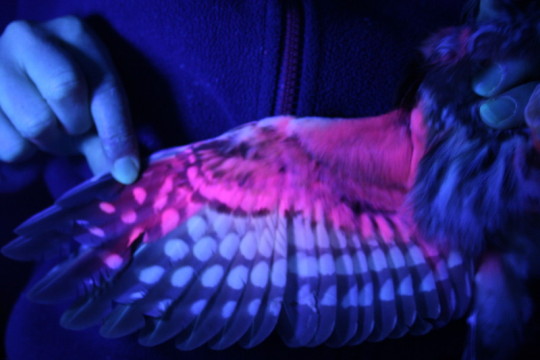
[Saw-whet owl wing under UV💡 ]
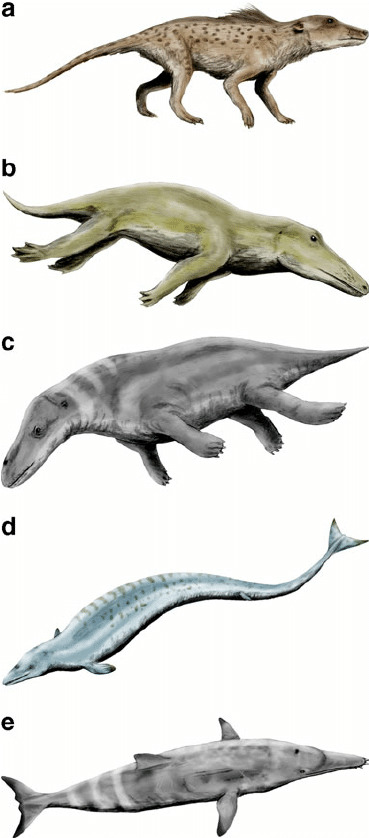
[OG whale💪🏻 ]
I've been playfully dubbed the "zookeeper of knowledge" by a friend in this context, after spending far too many hours working on a project because we kept getting side-tracked and discussing things not necessarily needed, but so incredibly interesting. (And it’s probably a title I'd gladly claim if it weren't so corny to be honest.) Regardless, it summarizes my commitment to becoming a curator of the captivating craziness that the animal kingdom has to offer. With a bias but passionate zoological perspective, I strive to share my spark of curiosity. ✨
Beyond my zoology lens, I strive for a focus on eco-consciousness in the work that I do, hoping to bridge the gap between science and the public and to foster stronger connection with Mother Nature.
As for translating these passions to children, I’m a firm believer in both transparency and honesty. While it’s almost guaranteed they won’t enjoy their first climate change lesson, I think forming traits of environmental stewardship and the understanding that actions have environmental consequences in children is critical if we want our passion for nature to be held by future generations. I remember my first lonely polar bear on a drifting ice berg video, and yes I was sad….but it left a vivid mark on my consciousness, shaping my understanding of the environmental challenges we face and it very likely brought me to where I am today.
Speaking of inspiring children, I cannot hold myself back as I have to show you guys what I found last week!
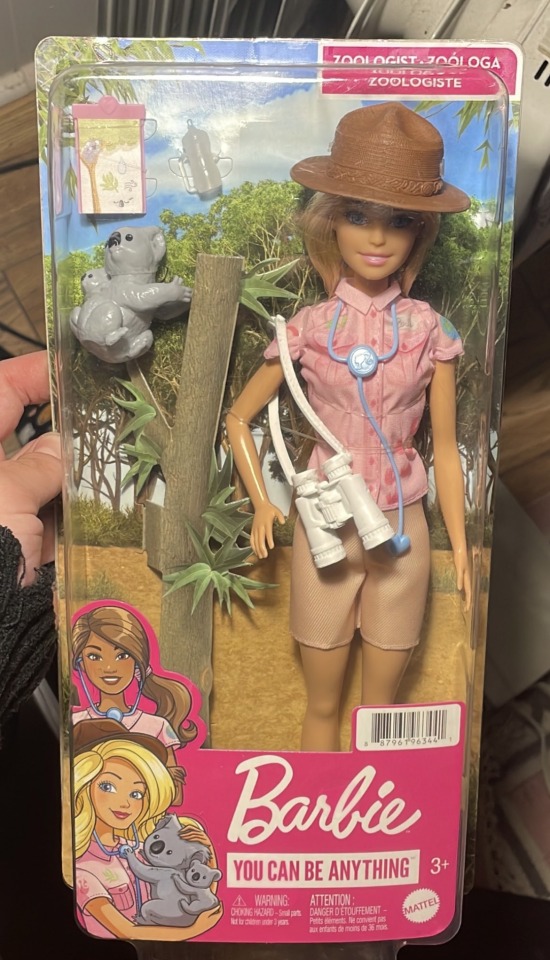
[Zoologist Barbie!!!!!!!!💗💗💗💗💗💗💗💗💗💗💗💗💗💗💗]
I'm not even that much of a Barbie fan but I think now I have to be! I would have exploded with joy if I had this as I kid! I mean, if Barbie is doing it, I can't even imagine how many little girls will now be exposed to the possibility of studying zoology or similar topics and I won't lie...I could cry 🥹 (not to mention how close the koala is to a lemur and my personal goals regarding that....interesting......verrry interesting 🔮)
Though I still think going outside with curiosity in mind is the number one way to develop a relationship with nature, I’d consider things and representations like this even more important in places like cities, where natural spaces are becoming less and less accessible due to never-ending infrastructure and the digital domination of screens and virtual experiences.
The allure of video games and online platforms often out-win outdoor activities at least in my own anecdotal experience, raising concerns about the disconnect between the younger generation and the natural world. I think environmental educators are becoming more and more important in schools, and I believe they play a pivotal role in counteracting this trend, as they offer opportunities for a child to focus on wonders within the natural world. I had a hard time myself trying to sound reasonable to many of my friends and family as a kid when saying I wanted to study animals and nature since technology was progressing so quickly and I was viewed as looking backwards.
and so I think this doll (or things similar) can reinspire or hold that flame when kids aren't yet to sure if they'll find a nice outdoor spot to explore, an educator excited to answer questions, or a community like Guelph that embraces natural sciences so much.
In my opinion, harsh climate crisis truths can surely be sugar-coated for young minds to an extent, but to completely wait until their old enough to ‘actually understand’ is just providing the perfect opportunity for a child to become a distracted or oblivious teenager or adult. Again, this is my opinion but at this point in time, in a current climate crisis with almost no signs of slowing down, being an adult in a country like Canada and purposely ignoring it is NOT cool!!
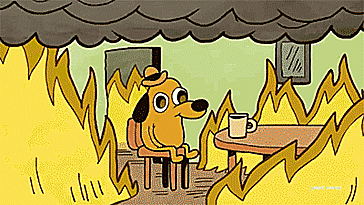
Now, we don’t have to live every moment with the weight of the world on our shoulders, and I don’t wish that on anyone! But I believe the absolute bare minimum is to consider our actions in relation to nature and provide the next generation the building blocks and exposure they'll need to make environmentally conscious choices. Concepts like reusable water bottles over disposable plastic ones, not littering, and realizing our planet belongs to others too aren’t scary things and if anything, promote cultures of care and community. These seemingly simple ideas start to lay the foundation for responsible and conscious individuals to gladly carry the torch of environmental awareness into the future!
Anyways, that's what's up with me, and so I hope you've found at least one thing on my blog that made you think about, reconsider, or learn something, and maybe even want to go hug a tree 💝🐛
Works cited
Johnson, N. A., Lahti, D. C., & Blumstein, D. T. (2012). Combating the Assumption of Evolutionary Progress: Lessons from the Decay and Loss of Traits. Evolution Education & Outreach, 5(1), 128–138. https://doi.org/10.1007/s12052-011-0381-y
Northern saw-whet owl outstretched wing under blacklight, by Seabrook Leckie, Attribution-NonCommercal-NoDerivs 2.0 Generic license, https://www.flickr.com/photos/rustyblackbird/
#nature interpretation#envs 3000#nature#zoology#zoologist barbie#climate change#environmental outreach#environmental education#barbie
3 notes
·
View notes
Text
Disclaimer
This blog was created for ENVS*3000, University of Guelph.
The opinions expressed here represent my own and not those of the University of Guelph.
The University of Guelph is not responsible for the accuracy of any of the information supplied by this blog.
2 notes
·
View notes
Text
ENVS*3000 Blog Post 1
Currently, my relationship with nature is important and meaningful. As I have grown up, my relationship with nature has become stronger. I have always loved nature but have begun to find a peace in it that I had never experienced before. This is because my attention to nature has become more prominent, thus increasing my appreciation for being within it (especially when hiking, swimming, etc). My understanding of nature and its processes has also grown, due to taking many environmental science courses.
In my case, my interpreter wasn’t a person, it was a website that gave a thorough overview of the history of the arboretum at Guelph, and how it came to be. It showed the different Indigenous tribes that lived on and cared for the land that now hosts the Arboretum. It then went on to explain the different people that owned the land, and how the University of Guelph’s Arboretum was formed historically. Now, when I look at the arboretum, or go for a walk there, I don’t just see a beautiful forest, I see the history and process of its creation. In short, I see a "bigger picture."
2 notes
·
View notes
Text
Disclaimer
This blog was created for the ENVS 3000 course at the University of Guelph.
The opinions expressed here represent my own and not those of the University of Guelph.
The University of Guelph is not responsible for the accuracy of any of the information supplied by this blog.
2 notes
·
View notes
Text
This blog was created for ENVS 3000, University of Guelph.
The opinions expressed here represent my own and not those of the University of Guelph.
The University of Guelph is not responsible for the accuracy of any of the information supplied by this blog.
2 notes
·
View notes
Text
Unit 06 - From Past to Present: Promoting Honesty in Environmental Interpretation
Hey everyone!
Edward Hyams’ quote illuminates the fundamental relationship between the past and present when it comes to interpretation. This realization is consistent with the ideas covered in ENVS*3000, which address the difficulties in accurately interpreting the past as well as the difficulties in presenting contentious histories (Beck et al., 2018).
The goals of environmental interpretation addressed in Unit 06 are in alignment with Hyams' claim that integrity requires the "keeping together of the parts of any whole". To make sense of the current landscape, environmental interpretation necessitates a grasp of the past (Hooykaas, 2024). This idea emphasizes the need of preserving the narrative's integrity across time, and it is comparable to the acknowledgment and assessment of history's significance in environmental interpretation.
The difficulties interpreters encounter when conveying historical narratives are covered in the textbook. The requirement of accuracy in interpretation is consistent with Hyams' claim that memory and familiarity with ancient things are necessary for integrity. The chapters stress the significance of identifying biases, distinguishing primary sources from secondary sources, and managing the dynamic nature of historical views (Beck et al., 2018).
Furthermore, the transient quality of interpretation is paralleled by Hyams' comparison of a railway station. The idea that history is incomplete as if a stop on a train only existed while our train was passing through, contradicts the idea that history is continuous (Beck et al., 2018). This is consistent with Unit 06's focus on the function of interpretation in fostering historical connections. Interpreters are like stewards of a railroad station; they make sure the station survives longer than a train passes by. The past becomes a continuing journey that informs the present through interpretation, rather than being limited to a past era (Beck et al., 2018).
The textbook’s discussion of the difficulties associated with controversial history highlights the necessity for interpreters to consider the difficulties of delivering difficult truths (Beck et al., 2018). According to Hyams, integrity requires knowledge of and remembrance of the past, which suggests a dedication to telling the truth about history despite disagreements. In the textbook’s discussion of the moral implications of historical interpretation, the notion that interpreters must approach difficult histories with tact and dedication to the truth is supported (Beck et al., 2018).
While reading the content for this week, I am reminded of my connection to the value of truthful storytelling. After hearing firsthand accounts from Holocaust survivors, the effects of this period of history are still very much present. The textbook's discussion of the Holocaust's aftereffects serves as a powerful reminder of the value of maintaining historical accuracy for future generations (Beck et al., 2018). In addition to visiting sites, such as Auschwitz, by educating visitors and creating awareness, Holocaust museums are a great source of information. By utilizing a variety of channels, including conferences, online events, exhibitions, and social media, they actively spread Holocaust consciousness and information to a broad audience, enhancing our understanding of historical facts (Oztig, 2023).
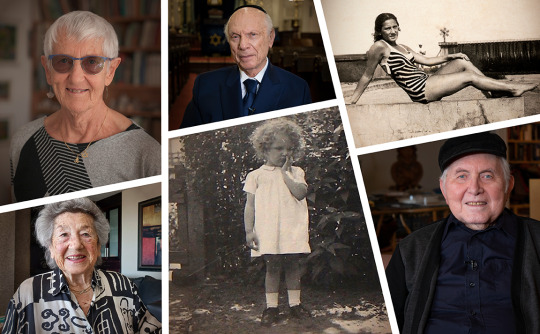
Holocaust Survivors - taken from https://www.un.org/en/holocaust-survivors-reflect
By dissecting this quote, interpreters can learn from Beck et al. (2018) and promote a more profound comprehension of the past, creating a story that endures while upholding moral and accurate historical interpretation.
References:
Beck, L., Cable, T. T., & Knudson, D. M. (2018). Interpreting cultural and natural heritage: For A Better World. SAGAMORE Publishing
Hooykaas, A (2024) Unit 4: Nature Interpretation Through Art and Planning for "All" Scenarios. ENVS*3000. University of Guelph
Oztig, L. I. (2023). Holocaust museums, Holocaust memorial culture, and individuals: a Constructivist perspective. Journal of Modern Jewish Studies, 22(1), 62–83. https://doi.org/10.1080/14725886.2021.2011607
4 notes
·
View notes